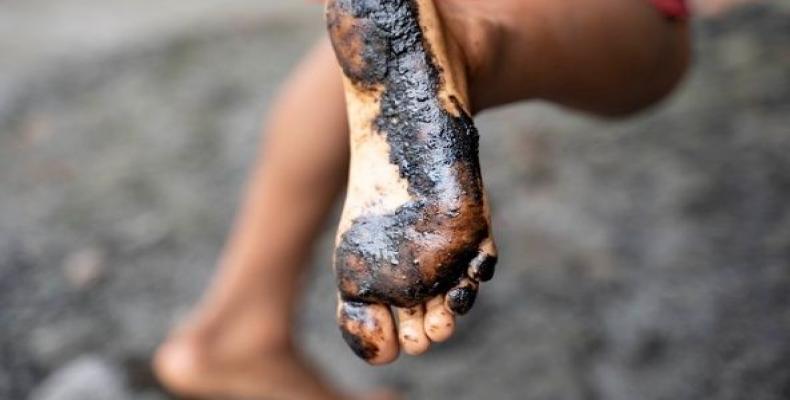Quito, May 1 (RHC)-- Indigenous people in Ecuador’s Amazon region have launched a lawsuit against Ecuador’s government as well as private and State oil companies over their responsibility in the country’s biggest oil spill in more than ten years, NGO Amazon Frontlines reports.
The legal action was filed in the provincial Court of El Coca, in the northeastern region of Sucumbios near the Colombian border. Earlier this month, on April 7, an estimated 15,000 barrels of crude oil poured into two of the country’s most important rivers, after two major oil pipelines ruptured.
The pollution from the spill affected more than 2,000 families and left some 120,000 people stranded without a safe source of food and water, as COVID-19 has already isolated indigenous peoples.
Authorities are accused of failing to meet their responsibilities toward indigenous communities, including undertaking a proper clean-up effort, providing communities with water and food, and providing timely information about the magnitude of contamination, the NGO said.
“We are already suffering from various illnesses caused by oil contamination, and now we are also facing this pandemic. We face discrimination as the State has failed to include us in its emergency plans yet again,” Kichwa leader and President of Kichwa indigenous federation (FCUNAE), Carlos Jipa, told the NGO.
“This is why the families, represented by FCUNAE, decided to join this lawsuit: we don’t want this to happen ever again,” Jipa said.
Dozens of community members testified that the spill had violated their constitutionally enshrined rights of territory, health, information, water and food sovereignty, a clean and ecologically balanced environment, and the rights of nature, according to Amazon Frontlines.
“By not taking action to prevent the risks, they (the government) failed to comply with their constitutional duty to protect people and nature, as enshrined in article 389 of our Constitution. We will be holding the State accountable and responsible for this oversight,” Lina Maria Espinosa, attorney for the case from Amazon Frontlines, said.
Experts have been warning for years that severe erosion along the Coca River put the pipelines at risk. Yet, Ecuador’s government took no action.
Hundreds of kilometers of rainforest riverways will be affected, and environmental impacts in one of the most bio-diverse areas on the planet will be devastated as a consequence of the spill.
The legal action urges immediate reparation, relief for affected peoples, and repair or relocation of the pipelines to prevent future spills. It was filed by FCUNAE and the Amazonian indigenous organization (CONFENIAE) along with other national and international human rights organizations against the Ministry of Energy and Non-Renewable Resources, the Ministry of the Environment, the state-owned oil company PetroEcuador, and OCP Ecuador.
The Provincial Court is expected to hold the trial within a few weeks. The plaintiffs also filed an injunction requesting the State to act immediately for the environment and the impacted communities pending prosecution and judgment.
This lawsuit comes almost one year after the Waorani people of Ecuador won a historic legal battle against the government to protect 500,000 acres of rainforest from oil extraction.
Indigenous, civil society groups and activists hope that this new lawsuit, combined with the nation’s massive foreign debt, will raise reflection and awareness over continued fossil fuel extraction in the Amazon, the “lungs” of the world.
“Oil spills are the death of biodiversity and life. The Ecuadorean State must remedy and suspend all extractive activities, and the extraction of other minerals polluting the environment,” President of the Confederation of Indigenous Nationalities of the Ecuadorean Amazon (CONFENIAE) Marlon Vargas said.
“This pandemic has shown the world very clearly that oil doesn’t sustain life. Instead, it is the forests and harvests of indigenous peoples and rural communities that are keeping us alive today.”


